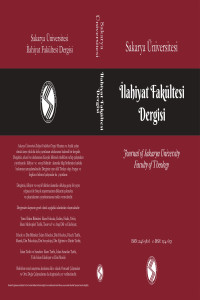Ortaöğretim Öğrencileri İçin Geleneksel ve Kültürel Din Algısı Ölçeğinin (OGEKDÖ) Geliştirilmesi: Geçerlik ve Güvenirlik Çalışması
Developing the Traditional and Cultural Perceptions of Religion Scale for High School Students (TARSH): Validity and Reliability Study
Author(s): Recep Murat, Mahmut ZenginSubject(s): Theology and Religion, Sociology of Religion, Psychology of Religion
Published by: Sakarya üniversitesi
Keywords: Psychology of Religion; Religious Education; Religion; Tradition; Culture; Perception; Religious Perception;
Summary/Abstract: Humans go through different developmental stages from birth to death, such as childhood, youth, adulthood, and old age. Although it is not possible to distinguish these developmental periods from the commonly accepted age limits, some age restrictions have been introduced to make it easier for us to know and understand. When the history of humanity is examined, it is possible to come across people who do not believe in any religion. Still, it is almost impossible to come across societies without faith. This is due to the acceptance of religion as sacred by societies and the functions that religion fulfills in society. Religion, which is an essential factor in directing people's lives and provides information about discovering and making sense of themselves, the world they live in, and the universe, also has essential functions in terms of constructing the self, identity, personality, and characters of the young people who are the subject of this study. In today's world, there will inevitably be fluctuations in the perspectives of religion due to globalization and social media environments, movies, and games where young people are interested and spend most of their time. If these perspectives, which change over time, can be determined correctly, the education of young people can be arranged accordingly and carried out perfectly. In order to make this arrangement, the religious perceptions of young people should be measured with a reliable and valid measurement tool. This study aims to develop a reliable and valid scale that measures high school students' traditional and cultural religious perceptions. When the literature is examined, scales have been developed to determine people’s religiosity in various disciplines, especially sociology, and psychology. Some scales developed about religiosity aimed to determine the types of religiosity and how religious people were, especially in Islam, and were generally applied to university youth. Only one study in the Turkish literature is directly related to this study and draws attention because it is aimed at high school students. Still, it is also a study that measures the perception of religion specific to Islam. All these studies reveal the internal and external aspects of religiosity, its reflections on social life, and types of religiosity, especially within the framework of the religion of Islam. On the other hand, this scale is concerned with how high school students perceive religion in general regardless of the religion of Islam, whether they see religion as necessary or not, and whether they care about the effects of religion on the individual and society in a traditional and cultural context. It is thought to differ from other scales in this respect.
Journal: Sakarya Üniversitesi İlahiyat Fakültesi Dergisi (SAUIFD)
- Issue Year: 25/2023
- Issue No: 48
- Page Range: 395-425
- Page Count: 31
- Language: Turkish

